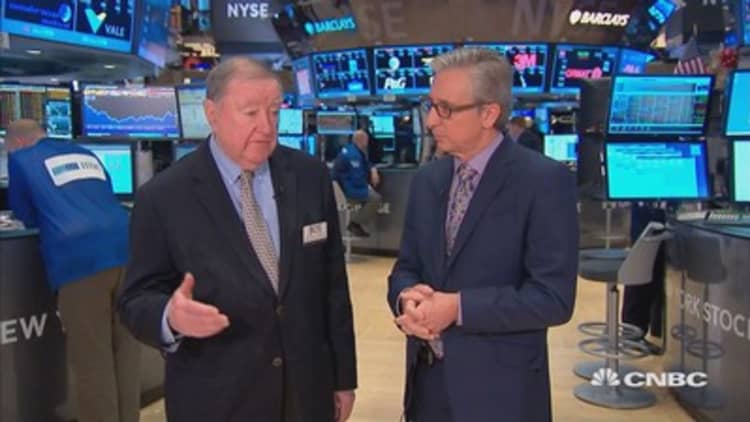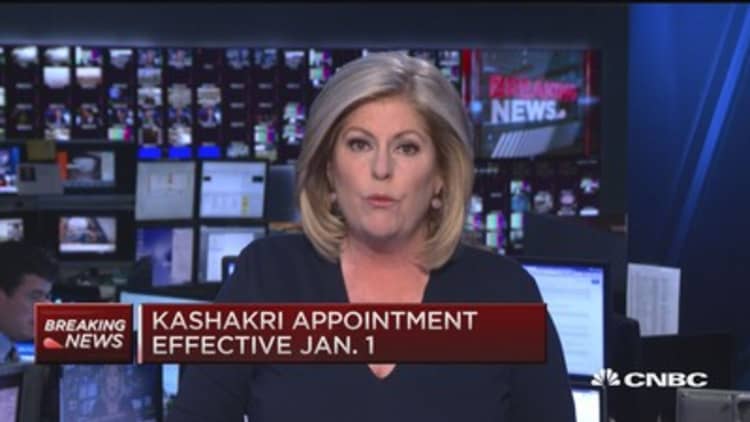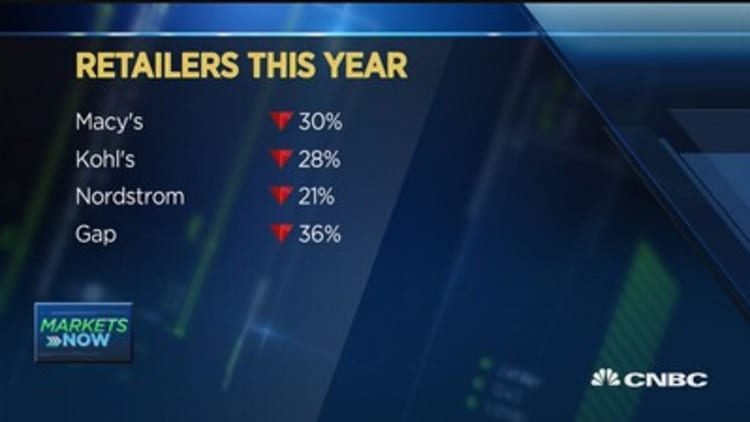



U.S. stocks closed narrowly mixed Tuesday, pressured by a more than 3 percent decline in Apple. (Tweet This)
Apple was the greatest weight on the Dow Jones industrial average, with the stock closing about 3.15 percent lower after a Credit Suisse report said the iPhone maker has cut as much as 10 percent of its component orders.
However, the Dow was able to close mildly higher, with UnitedHealth and Visa contributing the most to gains.
Read MoreApple mystery: Is Cook right or the supply chain?
The Nasdaq composite underperformed as declines in Apple and semiconductor stocks weighed. The Market Vectors Semiconductor ETF (SMH) closed about 1.59 percent lower.
The S&P 500 ended mildly higher near 2,081, with consumer discretionary leading advancers.
JJ Kinahan, chief strategist at TD Ameritrade, said it was encouraging the S&P 500 was able to hold 2,070 and that the VIX fell below 16 to near 15.
"They tried hard to sell the market today, there's no question about it," he said. "Clearly there's no sell fear."
Stocks opened mildly lower and held in a narrow range throughout the session. The Dow and S&P 500 fluctuated between positive and negative territory, while the Nasdaq composite never broke into positive territory.
"My guess is you'd see somewhat of a muted trade based on some of the news thus far. ... It's hard to be super pessimistic on the market given where we've been in the last six to eight weeks. At some point the market's going to have to look at this December decision from the Fed," said Ryan Larson, head of equity trading, U.S., at RBC Global Asset Management (U.S.).
"I think markets are generally ... globally just a bit fatigued. It's not surprising to see us take a bit of a pause as we wind (down) earnings season," he said.
European stocks closed mixed. Asian equities ended mostly lower, with only Japan's Nikkei closing a touch higher.
Overnight, data from China increased concerns of deflationary pressure and lack of domestic response to stimulus measures so far. The country's National Bureau of Statistics reported the October consumer price index rose a less-than-expected 1.3 percent from a year earlier, while the producer price index fell 5.9 percent for its 44th straight month of decline.
Read MoreEarly movers: DHI, BZH, BBY, AAPL, BLK, MYL, W, MNK, VRX & more
The major U.S. averages fell about 1 percent Monday for their biggest decline in six weeks, as investors weighed the odds of an interest rate hike by the Federal Reserve in December, as well as soft trade data from China.
The Dow is back in negative territory for the year so far.
"U.S. stocks are finally pulling back in what we see as a healthy development given the maturity of the upmove," BTIG Chief Technical Strategist Katie Stockton said in a note. "The pullback appears likely to take the SPX below its 200-day moving average, but we do not expect a return to secondary support near 2,000, noting that short-term overbought conditions are far from widespread."
Major averages 3-month performance
In economic news, import prices declined a more-than-expected 0.5 percent in October, while export prices fell 0.2 percent.
"The Fed is going to have to be super careful in raising rates in December if data continues to be soft," said Peter Cardillo, chief market economist at Rockwell Global Capital.
U.S. small business optimism was unchanged at 96.1 in October, with hiring stagnant even as more owners expected higher sales and more planned to make capital outlays, the National Federation of Independent Business said.
Read MoreStocks could learn how to trade from bond market
in September, the largest gain in 3 months.
"Generally the drift of the market is still lower on the prospect of higher, short-term rates," said Jack Ablin, chief investment officer at BMO Private Bank. "This has been a market that's been fueled by easy money."
The Treasury Department auctioned $24 billion of 10-year notes at a high yield of 2.304 percent.
Treasury yields held lower, with the 10-year yield near 2.33 percent and the around 0.87 percent. On Monday, the 10-year yield hit 2.377 percent, its highest level since July 21.
The U.S. dollar traded at its highest level since April against major world currencies. The euro was slightly weaker near $1.071 after hitting its lowest level since April 23. The yen held near 123.21 yen against the greenback.
Investors also awaited scheduled afternoon remarks from the Chicago Fed's Charles Evans, a dovish member of the Federal Open Market Committee (FOMC).
Earlier on Tuesday, the Federal Reserve Bank of Minneapolis named former Treasury official Neel Kashkari as its new president and chief executive officer, effective the beginning of next year.
Separately, Reuters reported that current Minneapolis Fed President Narayana Kocherlakota said in an emailed statement he will not participate in the Fed's December meeting. The Fed's most dovish policymaker is not a voting member of the FOMC.
Before the opening bell, the International Energy Agency (IEA) forecast the price of oil would reach just $80 per barrel by 2020, "with further increases in price thereafter."
Crude oil settled up 0.78 percent at $44.21 a barrel but is still down about 5 percent since the beginning of November.
"There's no doubt this recent downslide in oil prices is global deflation and the (stronger) U.S. dollar," said John Caruso, senior market strategist at RJO Futures.
Separately, Moody's said the world economy's ability to fight any future shocks would be hampered by years of ultra-low interest rates and high-profile liquidity injections.
Major U.S. Indexes
The Dow Jones Industrial Average closed up 27.73 points, or 0.16 percent, at 17,758.21, with Apple leading decliners and Visa the greatest advancer.
McDonald's closed 0.26 percent higher. Earlier, the stock touched a record high after reopening higher following news the fast food giant is not pursuing a REIT and is raising its dividend.
Shares of General Electric closed at $30.12, up 1.2 percent and ending above $30 a share for the first time since June 10, 2008. The stock hit $30 a share for the first time in intraday trade since Aug. 18, 2008.
Synchrony Financial will replace Genworth Financial in the S&P 500 after the close on Nov. 17, S&P Dow Jones Indices said Monday. The announcement follows the planned spinoff of GE's 85 percent stake in Synchrony. Shares of the consumer financial services company closed down 4.4 percent. Genworth closed 0.2 percent higher.
"The whole notion of spinning off Synchrony, getting that listed in the S&P 500 — that's all positive," said Marc Chaikin, CEO of Chaikin Analytics. "As an industrial company, the market likes the fact that (GE is) now focused."
The closed up 3.14 points, or 0.15 percent, at 2,081.72, with consumer discretionary leading seven sectors higher and materials the greatest laggard.
The Nasdaq composite closed down 12.06 points, or 0.24 percent, at 5,083.24.
The CBOE Volatility Index (VIX), widely considered the best gauge of fear in the market, held near 15.
Advancers were a step ahead of decliners on the New York Stock Exchange, with an exchange volume of 841 million and a composite volume of nearly 3.8 billion in the close.
Gold ended 40 cents higher at $1,088.50 an ounce.
— Reuters and CNBC's Peter Schacknow and Katy Barnato contributed to this report.
On tap this week:
Tuesday
Earnings: Kinross Gold
Wednesday
Earnings: Macy's, ADT, NetEase, Popeyes Louisiana Kitchen
Thursday
Earnings: SABMiller, Siemens, Advance Auto Parts, Burberry, Kohl's, Viacom, Energizer, Cisco Systems, Petrobras, Applied Materials, Nordstrom, Blue Buffalo, El Pollo Loco, Party City, Planet Fitness, Sunrun
8:30 a.m.: Jobless Claims
9:05 a.m.: St. Louis Fed President James Bullard
9:30 a.m.: Fed Chair Janet Yellen delivers welcoming remarks at the Federal Reserve's Conference
9:45 a.m.: Richmond Fed President Jeffrey Lacker
10 a.m.: JOLTS
10:15 a.m.: Chicago Fed President Charles Evans
11:45 a.m.: New York Fed President Bill Dudley
2 p.m.: Federal Budget
6 p.m.: Federal Reserve Vice Chairman Stanley Fischer
Friday
Earnings: Tyco, Berry Plastics, JC Penney, WGL Holdings
8:30 a.m.: Retail Sales; Retail Sales ex-autos; PPI; PPI ex-food & energy
10 a.m.: Consumer Sentiment; Business Inventories
12:30 p.m.: Cleveland Fed President Loretta Mester
More From CNBC.com:





